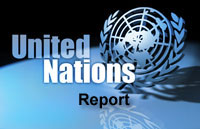
UNITED NATIONS (FinalCall.com) – The United Nations General Assembly adopted a $3.79 billion budget for 2006-2007 for its operating expenses, which generally isn’t news–but because of the way the negotiations were handled, it has become a major story around the globe.
“Negotiation over the biennial UN budget has been so severe that the Secretary-General’s trip to Japan was cancelled,” stated a Dec. 21 story in Japan’s Sankei Shimbun, which is published in Tokyo.
The Basler Zeitung of Switzerland focused on the effects of the early failure of the budget negotiations: “If the financial crisis cannot be overcome, the United Nations will have to use money reserved for unforeseen peace operations, which would result in a deep division among member states.”
At his year-ending press conference, UN Secretary-General Kofi Annan told reporters that the lights might go out if their budget was not passed before December 31. “We have seen budget struggles over the past, but this time, it is different. It is different in the sense that we are looking at major reforms for the organization,” Mr. Annan quipped.
Under the resolution adopted on the recommendation of the Budget (Fifth) Committee, the General Assembly agreed that the Secretary-General is authorized to spend $950 million on UN business at his discretion for the first half of the year, but will have to request any other funds needed.
The representative of Jamaica, which holds the rotating chair of the “influential” ‘Group of 77 developing nations and China, voiced dissatisfaction with what he termed “the closed-door negotiations” that led to the breakthrough. Negotiations and decision-making at the United Nations should be done in an open, transparent and inclusive process, he argued.
“Negotiations were conducted in a closed group behind closed doors. Unfortunately, that was becoming too frequent a practice,” the Jamaican diplomat said. His gravest reservation, however, was on the spending limitation of $950 million, which he noted turned a two-year budget into a six-month budget.
Suddeutsche Zeitung of Munich stated: “The UN is working with probation till midyear. The Member States agreed on the biennial budget after a long quarrel, but on the condition if there are no more concrete reform proposals for the UN administration, the organization will simply get no more money. John Bolton’s (U.S. ambassador) maxim ‘renew or die’ shall weigh henceforth in the UN headquarters in New York.”
Ambassador Bolton says that he is determined to wrest a cheaper, more efficient and more transparent administration at the UN. “But the U.S. blackmail strategy will not prevail in the long run,” maintained the Suddeutsche Zeitung newspaper. “The super power cannot solve these problems with threats and ultimatum.”
The European Union, which is a significant donor to UN activities, has opposed the Bush administration’s effort to link reforms and the 2006-07 budget. Its diplomats had proposed a one-year continuing resolution instead.
The six-month spending cap was endorsed by the U.S., along with Japan, Canada, Australia and New Zealand. These five nations fund approximately half of the regular UN budget.
The Chinese ambassador to the UN, Wang Guangya, told reporters that developing nations, which have more than 130 votes in the General Assembly, have a deep suspicion of U.S. reform goals. He also said that developing nations favored a two-year budget.
The Jamaican representative speaking again for the “Group of 77” developing nations and China said that, while he supported reform for the improved management and efficiency within the UN system, he opposed the imposition of the spending limit on the Secretary-General.
Reform will continue with increased momentum, offered Mr. Annan in a statement released after the budget resolution was adopted by the 191-member General Assembly by consensus. He pledged to put forward new proposals for improving management within three months.
There are still some who continue to question the motives of the Bush administration. Some suspect Amb. Bolton is less interested in reforms than in the disempowerment of the United Nations.
“The Group of 77 says that UN reforms are primarily driven by right-wing neo-conservatives in the United States who have made UN-bashing into a fine art,” writes Thalif Deen, an Inter Press Service UN correspondent.












